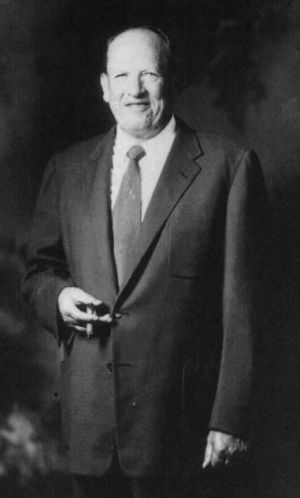Sidney Smyer: Difference between revisions
No edit summary |
(→Notes) |
||
| Line 12: | Line 12: | ||
{{stub}} | {{stub}} | ||
==Notes== | ==Notes== | ||
<small># Minor-1963 | <small># Minor-1963</small> | ||
==References== | ==References== | ||
Revision as of 08:27, 14 May 2012
Sidney William Smyer (born May 30, 1897 in Cherokee County; died August 1985) was an attorney, state legislator, president of the Birmingham Realty Company and chairman of the Birmingham Chamber of Commerce in 1963. That Spring he took responsibility for negotiating on behalf of the Senior Citizens Committee to forge the Birmingham Truce that culminated mass Civil Rights demonstrations of the Birmingham Campaign.
Smyer's family moved to Birmingham around 1900 and operated a dairy farm near the Alabama State Fairgrounds. He attended West End Elementary School and Birmingham High School. He went on to earn a degree from the University of Alabama School of Law and served in the army during World War I.
On returning to Birmingham, Smyer and his brother, Shuford joined the law firm of his uncles Edgar and Rufus Smyer, who represented industrial interests. Smyer helped create the Alabama Economy League in 1932 and lobbied the Alabama State Legislature on behalf of the "Big Mules". In 1934 he was elected to the State House of Representatives, and re-elected in 1938, taking over Eugene "Bull" Connor's former seat. A year later he was appointed general counsel to the board of the Birmingham Realty Company. He was named vice-president of the firm in 1942 and president in 1953. In 1967 his son, Sidney, Jr succeeded him as president and he became chairman of the board.
During Smyer's 14 year term as president of Birmingham Realty, he increased gross rental incomes from $343,000 to $1,243,000 and constructed 40 new commercial buildings, establishing himself as a prime force in the postwar development of Birmingham's downtown. He was a charter member of the Jefferson County Planning Commission when it was formed in 1947 and earned the nickname "Mr. Zoning" for his efforts.
Smyer was also active in a laymen's association at Highlands Methodist Church which actively opposed integrationist voices in the national Methodist denomination. Though interested in preserving segregation, the virulent antics of Birmingham Commissioner of Public Safety Bull Connor forced Smyer to re-evaluate his allegiances. He chaired the Senior Citizens Committee that negotiated a truce with leaders of the Alabama Christian Movement for Human Rights and the Southern Christian Leadership Conference, ending the organized campaign of mass demonstrations that became headline news around the world due to Connor's use of police dogs and firehouses to break up demonstrations by children at Kelly Ingram Park. Smyer assured the press that: "Ninety days after the Supreme Court decisions on the Birmingham city government, eating facilities in the stores will be desegregated on a trial or test basis. Within thirty days any remaining white and colored signs over drinking fountains and restrooms will be removed, and without delay fitting rooms (which always have been private and for the use of one customer at a time) will be desegregated. Employment opportunities for Negroes will be upgraded. Within sixty days at least one sales person will be employed in one store."1.
Notes
# Minor-1963
References
- Minor, Dale (May 11-14, 1963) field recording of Sidney Smyer, included in Robert Kramer, Chris Koch and Dale Minor, producers (1966) "Freedom Now!" radio documentary. New York, New York: WBAI-FM. Published by the Pacifica Radio Archive, Los Angeles. Archive # BB0385A-B
- Eskew, Glenn T. (1997) But for Birmingham: The Local and National Movements in the Civil Rights Struggle. Chapel Hill: University of North Carolina Press. ISBN 0807846678
- Spence, Steve (2011) "Cultural Globalization and the US Civil Rights Movement." Public Culture, Vol. 23, No. 3, pp. 551-72
